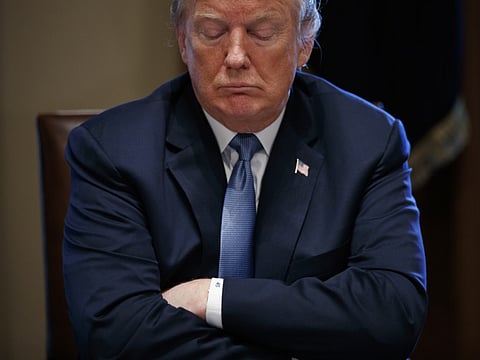Will Trump’s hardline Iranian policy have any impact?
If Tehran is not persuaded from intervening in the affairs of Arab states and prohibited from developing ballistic missiles, it will emerge as an even greater threat to regional peace

Oh, how Iran’s fortunes have changed since those heady days of President Barack Obama’s promised detente! It wasn’t that long ago since the Iranian President Hassan Rouhani armed with a multibillion dollar shopping chest was feted in European capitals.
Obama and his secretary of state John Kerry were set on bringing Tehran back into the international fold regardless of the regime’s continued aggression against its neighbours, its support of armed proxies in Lebanon, Yemen and Iraq, its military intervention in Syria and its development of ballistic missiles, not to mention its flagrant human rights abuses.
In return for an end to economic sanctions, all Iran was required to do under America’s ill-conceived deal made in tandem with the UK, France, China, Russia plus Germany was to sign an agreement with a sunset clause limiting uranium enrichment while opening the door to the nuclear watchdog, the International Atomic Energy Agency, to carry out intrusive inspections of its nuclear facilities.
President Trump’s decision to pull his country out of a deal he called “decaying and rotten” is bitterly opposed by all America’s co-signatories citing the fact that Tehran had stuck to its narrow terms. The move automatically re-imposes a raft of sanctions to take effect in August with new ones scheduled to bite in November targeting Iran’s banking and oil sectors.
The EU has promised to propose a package of measures designed to keep the deal alive, one that would aim at protecting European companies doing business with Iran from US-imposed secondary sanctions; these are still under discussion.
However, most international corporations are rightly wary of incurring America’s wrath in the form of harsh penalties; several have wasted no time in terminating their contracts with Tehran, others are limiting their operations.
Turkey has refused to comply with Washington’s unilateral instructions to halt Iranian oil imports. Last month, Russia and China signed deals with Tehran to the tune of hundreds of billions of dollars. Qatar’s relationship with Iran is growing stronger since it restored full diplomatic ties, an alliance that runs contrary to positions adopted by most GCC states.
Nevertheless, Iran’s Foreign Minister Javad Zarif recently warned that his nation might withdraw from the nuclear deal within weeks when it will resume enriching uranium to 20 per cent.
Without cooperation from allies, US sanctions alone cannot bring Iran’s economy to its knees but it appears to be going in that direction all by itself in a climate of no-confidence. Foreign investment is negligible. The rial is plummeting causing Iranians to hoard foreign currencies. Burgeoning prices and record unemployment highs have sparked civil unrest.
Thousands of angry demonstrators flooded the streets around Tehran’s Grand Bazaar last week; others clashed with security forces outside the parliament building. A “large number of agitators” have been arrested said the city’s chief prosecutor.
With several of Trump’s advisers and allies advocating regime change in Iran, among them a former mayor of New York Rudy Giuliani and former House Speaker Newt Gingrich who’ve blasted America’s European allies for not getting on board, Iran’s Supreme Leader Ali Khamenei has received the message. On Saturday, he accused the United States of sowing discord in an attempt to create gaps between the people and their government.
If regime change is indeed the ultimate goal of the Trump administration’s sanctions, success is unlikely. Ten years of crippling sanctions responsible for the deaths of thousands of Iraqi children did not dislodge Saddam Hussain. Decades of sanctions against North Korea have done nothing to dampen the people’s enthusiasm for their ‘Dear Leaders’ even during periods when many in rural areas were forced to suffer starvation.
Authoritarian leaderships use violent tactics to quell rebellions before they can gather speed. No matter what hardships Iranians might face over coming months due to sanctions the chances of an Iranian Spring, requiring simultaneous mass uprisings all over the country supported by the Iranian military including the powerful and loyal Iranian Revolutionary Guard are minimal to non-existent.
Unless the regime can be persuaded to cease intervening in the affairs of Arab states and is willing to abide by UN Security Council Resolution 1929 prohibiting it from activities relating to ballistic missiles capable of carrying nuclear weapons, it will emerge as an even greater threat to regional peace and security than it surely is today.
Linda S. Heard is an award-winning British political columnist and guest television commentator with a focus on the Middle East.



